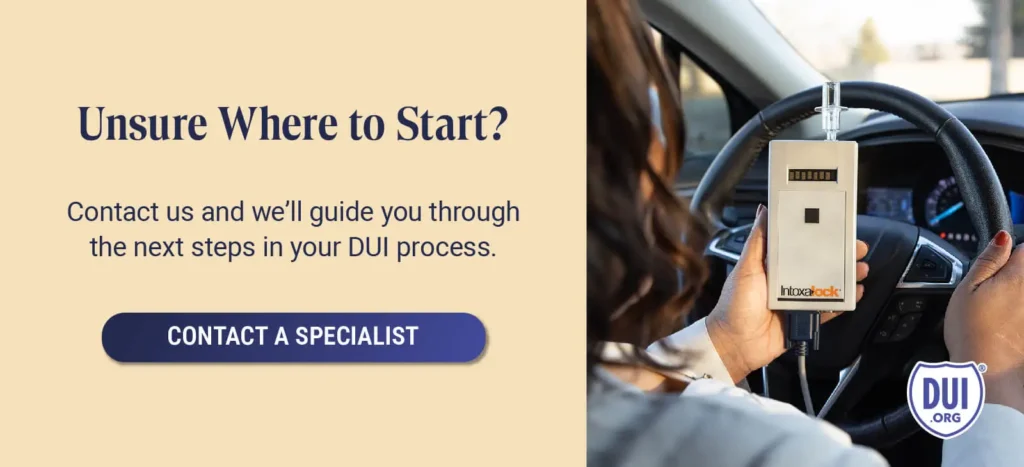
The severity of a DUI in California depends on factors like prior offenses, injury, or breathalyzer test results.
In California, a DUI charge can be classified as a misdemeanor or a felony, and knowing the difference can significantly impact your legal future. Under California DUI laws, the severity of a DUI depends on factors like prior offenses, injury, or high Breath Alcohol Concentration levels (BrAC).
This guide breaks down the key distinctions, helping you understand the legal consequences and implications of each charge.
IMPORTANT: DUI.org provides general information but does not give legal advice. Consult a qualified attorney for legal guidance specific to your situation.
What is the Difference Between a Felony and Misdemeanor DUI in California?
Here’s a breakdown of the key points to help you understand DUI charges and penalties according to California law:
Misdemeanor DUI
A misdemeanor DUI in California applies to first, second, or third offenses without severe factors and can lead to penalties such as fines, probation, or a short jail term.
Felony DUI
A felony DUI in California involves severe circumstances such as injury, death, prior DUI convictions within 10 years, or a high Blood Alcohol Concentration (BAC), resulting in harsher penalties. Felonies typically lead to longer prison time, higher fines, and longer probation compared to misdemeanors.
Consulting a DUI attorney can help clarify your case and improve your outcome.
Is a First-Time DUI a Felony or Misdemeanor?
A first-time DUI in California is typically a misdemeanor, with penalties including probation, fines from $390 to $1,000*, DUI classes, and a six-month license suspension. Jail time is possible but often replaced with probation.
However, if a first-time DUI causes serious injury, death, or includes aggravating factors (like a minor in the car), it can be upgraded to a felony. Under 2025 California DUI laws, this can result in harsher penalties, including longer prison terms and higher fines.
What Makes a DUI a Felony in California?
- Multiple DUI Convictions: A fourth DUI within 10 years automatically escalates to a felony.
- DUI Causing Injury or Death: Severe injuries or fatalities typically result in felony charges under California’s "wobbler" law.
- DUI with a Suspended License: Driving under the influence with a suspended or revoked license can result in felony charges.
- Aggravating Factors: High BrAC levels, reckless driving, or having minors in the vehicle can elevate the charge to a felony.
For a broader understanding of how DUI offenses are classified across states, check out DUI felony states.

Can a Felony DUI be Reduced to a Misdemeanor in California?
Yes, a felony DUI in California can potentially be reduced to a misdemeanor under certain conditions. Here are the primary ways this can happen:
Factors Considered by the Court
- Severity and Criminal History: The court looks at the incident's severity and your prior criminal record. Minor injuries and no prior felonies improve the chances of a reduction.
- Compliance and Rehabilitation: Courts consider your probation compliance and participation in rehabilitation programs, which can positively influence the decision.
Plea Bargains and Negotiations
- Negotiating Lesser Charges: Attorneys can negotiate for lesser charges like "wet reckless" or "dry reckless" if mitigating factors exist.
- Weak Evidence: Lack of severe injuries or weak evidence can make the prosecution more open to reducing the charge.
Penal Code 17(b) Motion
A Penal Code 17(b) Motion allows certain felony DUI convictions to be reduced to misdemeanors. This motion applies to "wobbler" offenses, which are crimes prosecutors can charge as either felonies or misdemeanors. Typically, you can become eligible to file this motion after successfully completing probation.
If granted, the 17(b) Motion can significantly impact your criminal record, potentially improving your access to employment and housing. It's an important tool if you want to mitigate the long-term consequences of a felony conviction, provided you meet the eligibility criteria and have demonstrated rehabilitation through probation compliance.
How to Defend Against a Felony DUI Charge in California
Your DUI attorney can defend you against a felony DUI charge in California with several strategies, including:
- Challenging the Traffic Stop: Argue whether the stop lacked probable cause or the arrest procedure was flawed.
- Disputing BrAC Results: Highlight faulty equipment or medical conditions that affect BrAC levels.
- Mitigating Factors: Present a clean record or participation in rehabilitation to seek leniency.
Each case is unique, so it's essential to work closely with an experienced DUI attorney to determine the best defense strategy tailored to your circumstances.
What are the Long-Term Consequences of a Felony DUI in California?
California DUI laws can impose lasting consequences for a felony DUI conviction, affecting jobs, housing, education, and insurance.
- Employment Restrictions: A felony DUI can disqualify you from many jobs, especially those involving driving.
- Professional License Loss: Fields like law or medicine may revoke your professional license.
- Housing Difficulties: Felony convictions can lead to housing application rejections due to background checks.
- Educational Barriers: Schools may deny admission or scholarships based on your felony record.
- Increased Insurance Rates: Insurance premiums rise significantly, with some policies being non-renewed.
- Social Impact: Felony convictions can affect personal relationships and social standing.
Get Guidance with DUI.org
Facing a DUI charge in California can be overwhelming, especially if you are navigating California DUI laws for the first time. Need help navigating ignition interlock device and SR-22 insurance requirements after a DUI? Our state specialists at DUI.org are here to guide you every step of the way. We’ll help you understand your options and make the process as smooth as possible so you can get back on the road with confidence. Call (877) 246-7808 today to get started!
Visit DUI.org to explore how we can help you overcome your DUI challenges. Learn more about DUI.org and the importance of hiring a DUI lawyer to navigate your legal journey.
*Penalties and fines are based on February 2025 state laws and are subject to change if state laws are amended in the future. Check with your legal representative or current state DUI laws for up-to-date penalties.
Get support.
What is next? We can help you through the process. Give us a little information and we can support you through the next steps.
All fields are required.